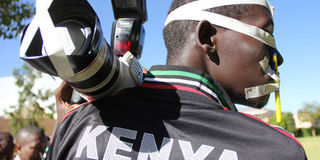Media bodies move to court to challenge new law

A journalist in Eldoret town holds a demonstration against the Media Bill on December 03, 2013. JARED NYATAYA
What you need to know:
- The Kenya Editors Guild, Kenya Union of Journalists and the Kenya Correspondents Association claimed that the Kenya Information and Communication (Amendment) Act and the Media Council Act 2013 contravene constitutional freedoms of the media and should be declared invalid, null and void.
- Mr Orengo accused President Kenyatta of turning the institution of the presidency into an unconstitutional lawmaking body as opposed to the defined, restricted and limited role the president plays in assenting to Bills from the National Assembly.
Media practitioners have moved to court to challenge the draconian media law assented to by President Uhuru Kenyatta last month.
The Kenya Editors Guild, Kenya Union of Journalists and the Kenya Correspondents Association claimed that the Kenya Information and Communication (Amendment) Act and the Media Council Act 2013 contravene constitutional freedoms of the media and should be declared invalid, null and void.
And to safeguard public funds in the event the court finds that the two Acts are unconstitutional, the media practitioners want an order stopping recruitment of chairperson and members of the Media Council of Kenya and Communication and Multimedia Appeals Tribunal.
The petition was filed through Senior Counsel and Siaya Senator James Orengo who argued that selection and appointment of the members would violate journalists’ rights and fundamental freedoms guaranteed by the constitution.
“The public and the government will incur unnecessary and unjustified expenditure in view of the unconstitutional status and establishment of the Media Council of Kenya and the Communications and Multimedia Appeals Board,” said Mr Orengo in the petition.
Mr Orengo argued that the enactment of the KICA and the Media Council Act was oppressive, unlawful and meant to harass journalists, adding that there was no way the Acts could give effect to two separate bodies with similar powers to check the conduct of journalists.
“Concurrent existence of two distinct bodies dealing with same subject but establishing different oversight mechanisms and two different sets of media standards and punishments is unconstitutional, unfair, oppressive and prejudicial,” said Mr Orengo.
He accused President Kenyatta of turning the institution of the presidency into an unconstitutional lawmaking body as opposed to the defined, restricted and limited role the president plays in assenting to Bills from the National Assembly.
He argued that the decision of Information Cabinet Secretary Fred Matiang’i to declare vacancies in the positions of chairpersons and members of the Media Council of Kenya and Communication and Multimedia Appeals Tribunal was irregular and should be struck out.
“The purported power exercised by the Cabinet Secretary was unconstitutional, unlawful and invalid since he cannot authorise the appointments based on two unconstitutional laws passed by parliament,” said Mr Orengo.
In any event, Mr Orengo submitted that the KICA and the Media Council Act violated both the Senate and National Assembly standing orders which required the input of both houses before the president could assent to them.
He accused the National Assembly of unilaterally passing the two repressive Bills without considering the constitutional framework under which they are supposed to undertake their duties.
“The said violations denied the petitioners the right to equal protection and equal benefit of the law which safeguards their sovereignty, national values, good governance and no-discrimination,” he said.
He added that some sections of the Media Council Act 2013 are inconsistent with the constitution since the sanctions they impose on journalist and media houses goes beyond what is stipulated in an open democratic country.
He argued that Communications and Multimedia Appeals Tribunal once constituted will not be independent and impartial since the Cabinet Secretary will have the power to suspend any member.
“The Tribunal cannot afford the petitioners or journalists a fair hearing as an independent body as provided by the constitution since the alleged offences are not specified under the Act,” said Orengo.
He added that the Tribunal’s power to impose criminal sanctions against a journalist and to recommend suspension of the journalist without the process of a fair hearing will be a violation of their rights to equality before the law and fair administrative action.
He said the provisions of the two Acts will subject journalists to cruel, inhuman and degrading treatment which will result to loss of income and sources of livelihoods.
Among the issues they want determined are whether the Acts are a violation of media practitioners constitutional rights, whether the Bills were passed in accordance with the constitution and whether the National Assembly ought to have consulted the Senate before passage of the Bills.
If the petition is successful, the media practitioners want the two Acts declared unconstitutional, null and void.
They also want an order stopping the Cabinet Secretary from proceeding to appoint any member to the Media Council of Kenya and the Communications and Multimedia Appeals Board.





